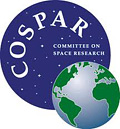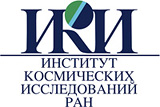First Announcement
International Colloquium and Workshop
"Ganymede Lander: scientific goals and experiments"
Space Research Institute (IKI), Moscow, Russia
4-8 March 2013
Purpose
A study of Jupiter system is an important part of international efforts to understand the origin of Galilean satellites and more generally the origin of the Solar System. Few years ago Russian Academy of Sciences and Roscosmos proposed to include a Lander for investigation of one of the moons of Jupiter, namely Europa or possibly Ganymede, as an additional element of EJSM/Laplace international mission to Jupiter system. This is considered as a very important component of Roscosmos’s long-term strategic plan for reinforced cooperation with ESA and NASA. Ganymede – the third of Galilean satellites is becoming now the final destination point of the European JUICE mission. Its concept results from the reformulation of the EJSM/Laplace mission into a European-led mission. On the other hand Russia is working now on a lander concept for Ganymede. Russian GL (Ganymede Lander) will be a partner mission for JUICE. The main scientific object of GL will be a search of possible present and past signatures of life and ‘in situ’ studies of the environment from the surface by remote and contact methods. In addition to coordination of scientific tasks, certain number of practical problems (e.g. navigation, data transfer, types of surface topography information for landing etc.) are planned to be discussed during these Colloquia. Russian GL mission is presently aimed for launch in 2023-2024, though this schedule might be revised in the future and aligned with JUICE. Science payload of the mission is being considered, and international participation is welcomed.
Workshop information:
The Ganymede Lander Colloquium and Workshop (GLCW) will have the status of COSPAR Colloquium, and COSPAR acts as one of the event's co-sponsors. GLCW will be hosted by the Space Research Institute (IKI) of Russian Academy of Sciences in Moscow, Russia, from March 4 to 8, 2013. It will last 5 days (including the days of arrival/departure and some sightseeing events) and consists of several sessions dedicated to the scientific goals and logistics of the projects, key issues of Ganymede science, with special emphasis to the astrobiology, and discussion of the proposed scientific instruments:
- Scientific tasks: current knowledge of Ganymede environment (interior, surface and atmosphere). Results from Pioneers, Voyagers, Galileo, New Horizons and ground-based telescopes.
- Astrobiology vision of Ganymede.
- Synergy with JUICE mission spacecraft (possible joint experiments). Orbital constraints, radio relaying options.
- Scientific payload for Ganymede Lander: scientific goals, cost, mass and energetics, technical aspects.
- Priorities for selection of landing site.
- The Lander project including radiation protection.
Proceedings are planned to be published in Advances in Space Research (ASR) Special Issue.
Workshop website: http://glcw2013.cosmos.ru
LOC e-mail: glcw2013@cosmos.ru



